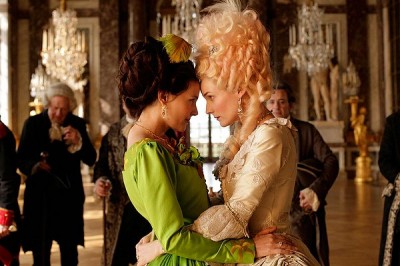
When I settled in to watch Benoît Jacquot’s Farewell, My Queen, it was with grave misgivings and gloomy foreboding. Another movie about Marie Antoinette was maybe not the last thing I wanted to see, but it was pretty high on that list. So it was a very pleasant surprise to find that this was far from your average Marie Antoinette biopic. In fact, it’s questionable whether it should be called a biopic on the “Let them eat cake” lady at all. And it’s most certainly not an epic about the French Revolution. There are no battles and nary a glimpse of a guillotine. Most of the action pieces you think of occur offscreen or are dealt with by titles after the film proper concludes. Instead, what we have is a look at those last days at court through the eyes of a servant, the Queen’s reader, Sidonie Laborde (Lea Seydoux — the girl Owen Wilson ends up with in Midnight in Paris). The results are far more compelling than anything I might have expected — and are heightened by Jacquot’s constantly inventive direction.

It isn’t just that the film doesn’t revel in the postcard imagery of a film like Sofia Coppola’s Marie Antoinette (2006). Here we see some of those images, but we also see the cramped, unadorned, crude and apparently mosquito-infested parts of Versailles where the servants are stashed away. We see the dead rats in the kitchen and in the waters of the palace’s imitation Venice. We see the practice of splashing on perfume to mask body odor. It’s the kind of detail that would have warmed the heart of Erich von Stroheim at his most sour. Rather than the usual array of well-dressed aristocrats, the film gives us the grim reality of the people who keep all the pomp going.

What it doesn’t do is try to paint them as any better than they are. They’re petty and possibly even greater snobs than anyone they serve. They jockey for position with their “betters” and have their own pecking order of importance. Our heroine isn’t appreciably better than the others, though she becomes more sympathetic — partly because we spend more time with her, but more because it quickly becomes apparent that Sidonie has a terrific and very human crush on the Queen (Diane Kruger). It’s hopeless, of course. And it’s very painful because the Queen is not only unaware of it (albeit ignorantly playing to it), but feels free enough with Sidonie to confide in her about her own feelings for Gabrielle de Polignac (Virginie Ledoyen, The Valet) — even to imvolving her in their relationship. Ultimately, she will even press Sidonie into undertaking a favor very much beyond the call of duty.

All of this (and subtext upon subtext) goes on while the nobility crumbles — something that is discovered in piecemeal fashion from rumors and overheard conversation in that time before the age of mass communication. It’s an unusual and involving approach — one that immerses the viewer in the world of the film and its limitations. I’m not sure the material has ever been approached this way, and it pays dividends. Rated R for brief graphic nudity and language.




Gone come Friday.
Well, it was highly unlikely than this one would be worse than Coppola’s.
Well, yeah. Or duller.